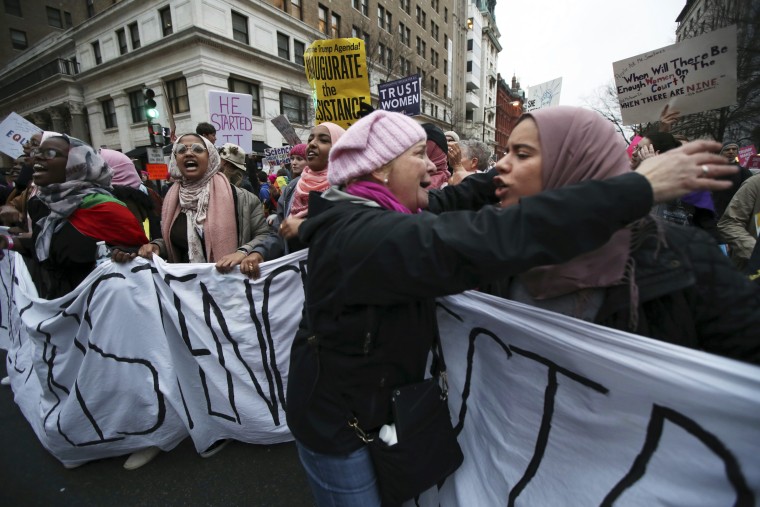U.S. Jews and Muslims are often seen as being at odds, with turmoil in the Middle East sometimes driving them to opposite ends of the ideological spectrum. But facing a spike in religion-based hate crimes, Jews and Muslims are increasingly forming coalitions nationwide.
Jewish groups intensified support for Muslims after President Donald Trump signed an executive order temporarily banning refugees and immigrants from seven Muslim-majority countries.
"We have been vocal at the national and regional level about our opposition to the travel ban," Jonathan Greenblatt, chief executive of the Anti-Defamation League, or ADL, told NBC News on Tuesday.
Just a week after the election, Greenblatt made headlines when he declared that if Trump were to follow through on his stated plans to create a national Muslim registry, "This proud Jew will register as Muslim."
Greenblatt said that although the ADL had always worked in tandem with the Muslim community, the need increased in "recent months," with the ADL filing briefs on behalf of Muslim plaintiffs in civil rights cases, including the Washington state case that temporarily halted implementation of Trump's executive order on travel early this month.
Jewish response to the travel order hasn't occurred just at the nonprofit level: At protests outside John F. Kennedy International Airport in New York City, many people waved signs reading "Never Again" while making referenced to the Holocaust and other historical instances of discrimination against Jews.
"They're doing to Muslims like they did to us," JFK protester Callan Hetchison told the Forward (formerly the Jewish Daily Forward) on Jan. 28. Hetchison carried a sign with a yellow Star of David on it — the badge Jews were forced to wear to identify themselves during the Nazi regime.
In Los Angeles, one group that has been working to strengthen Muslim-Jewish relations since 2006 reports an spike in interest this year. Aziza Hasan, executive director of NewGround, told NBC News that public NewGround events typically involve passing around sign-up sheets. They get two or three signatures.
"Now, sign-up sheets are coming back to the office full after public speaking events, and we have so many inquiries into the office that we can't respond to all of them," Hasan said.

The desire to bridge Muslim and Jewish communities may have intensified since the election, as both religious minorities express concerns over a White House in which presidential advisers like Stephen Bannon and Stephen Miller have been accused of having white supremacist ties.
But the momentum for a Muslim-Jewish coalition has been building for a while; the American Jewish Committee began work with the Islamic Society of North America, in 2015 — the year that FBI data showed a stunning 67 percent rise in hate crimes against Muslims.
Even without FBI hate crimes data, anecdotal surveys and news reports have shown a rash of discriminatory incidents since the election. A Southern Poverty Law Center survey of more than 10,000 teachers and school administrators found that the "use of slurs and other derogatory language, and disturbing incidents involving swastikas, Nazi salutes, and Confederate flags," had increased.
Rising hate crimes spurred the formation of the Muslim-Jewish Advisory Council, or MJAC, a group of 38 high-profile business leaders, government officials and others. The nonpartisan council aims to combat discrimination with engagement at the highest levels of government.
"We feel we have a partnership with the new Trump administration," said Robert Silverman, the council's U.S. director of Muslim-Jewish Relations.
Silverman told NBC News that a senior member of the Trump administration, whom he declined to name, joined a council meeting Feb. 1 and "reassured us that civil rights laws will continue to be prosecuted."
Related: Demonstrators, Civil Rights Groups Rally in Defense of Immigrants, Muslims After Executive Orders
New Attorney General Jeff Sessions has been known for speaking out against adding anti-LGBTQ violence to hate crimes law, but he's also a strong advocate for religious freedom — and that's where Silverman sees a bridge between the MJAC and conservative-leaning Republicans.
"Our concern is hate crimes against people of faith," Silverman said. "If you frame it that way, you bring in evangelicals [and] Christian churches that have been discriminated against, like Seventh-day Adventists and Jehovah's Witnesses. It resonates beyond our two [Jewish and Muslim] communities."
Silverman was careful to point out that the MJAC opposed Trump's executive order. "This was a ban based on a religion," he said. "We had to say something about it." But he said the council is focused on hate crimes, not protest.
In at least 14 cities on Wednesday, however, rallies will protest Trump's meeting with Israeli Prime Minister Benjamin Netanyahu. The New York rally, which takes place at 5:30 p.m. at Grand Central Station, is partly organized by a new group called MuJew Antifa.
A spokesperson for MuJew Antifa told NBC News that its goals are "to strengthen ties between our communities, to support each other in a time of hate and to forge a united front against fascism, Islamophobia and anti-Semitism."
Another group that doesn't shy away from protesting in the streets is Jews for Racial and Economic Justice. The group is a frequent participant in New York protests, and some of its members will attend Wednesday's rally at Grand Central Station.
"Jews refuse to buy into this administration's rhetoric of fear and hatred, which has fueled the kind of anti-Muslim bigotry we've seen in this country since September 11th," Jews for Racial and Economic Justice member Keren Soffer Sharon told NBC News
Sharon said Jews must stop viewing Muslims as enemies: "We are family, and always will be."